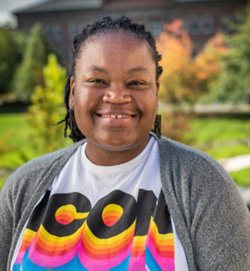
Candice Price received her doctorate in mathematics from the University of Iowa. She is an Associate Professor in the Department of Mathematics and Statistics at Smith College, and her published work spans diverse areas of research including applied mathematics, mathematics of social justice and discrete mathematics.
Candice is renowned for her advocacy of inclusivity and diversity in STEM fields and for her mentorship of aspiring mathematicians, particularly from underrepresented backgrounds. Her numerous awards include the 2022 Mathematics Association of America Inclusivity Award and the 2024 Deborah and Franklin Haimo Award for Distinguished College or University Teaching of Mathematics.
1. What’s your earliest memory of doing mathematics?
It was learning how to multiply. I know that I knew how to add and subtract but I do not recall how I learned. But I learned to multiply with Schoolhouse Rock! videos. I loved music and the idea that I could learn mathematics through music hooked me!
2. How has mathematics education changed in the time you have been involved in it?
There is much more of a push towards understanding mathematics through construction and less through memorisation, I think. Meaning, we really hope that students will understand how to get to an answer through logic, or working the problem from basic steps until the new steps feel more basic or intuitive. I think we have tried to move away from the rote memorisation of formulas and processes. What this does is allow folks to take different paths to get to the same solution, allowing for more creativity and individual learning pace.
3. Tell me about a time in your career when something totally flabbergasted you.
I recall being shocked as a graduate student at how many open problems in math there still are. The kinds of problems that are conjectures that ‘feel’ very true but there is no mathematically rigorous proof yet. It’s exciting to know that there is still so much opportunity for breakthrough mathematics.
4. Do you practise mathematics differently in company?
Yes. When speaking to other mathematicians, I can use different notation and language than when I am speaking to someone who has not studied math as deeply. But this is an important skill that everyone should have – the ability to explain your work to anyone, no matter their experience or background.
5. Do you think a brilliant maths teacher is born or made?
Oh, definitely made. They consist of someone who is knowledgeable of the material but also flexible and open to reflection. I could be teaching the exact same lesson to two different groups of students and need to take different approaches in order to reach the two groups. We have to think about our students as individuals which means we have to be trained to be open to various forms of feedback in order to pivot when needed.
6. What’s the most fun a mathematician can have?
I think the most fun we can have is when we are teaching! In these moments we have so many different minds coming together to think about some math topic and that creative space can be so much fun!
7. Do you have a favourite maths joke?
Why can’t your nose grow to be 12 inches long? Because then it would be a foot.
Join the conversation: You can tweet us @CambridgeMaths or comment below.